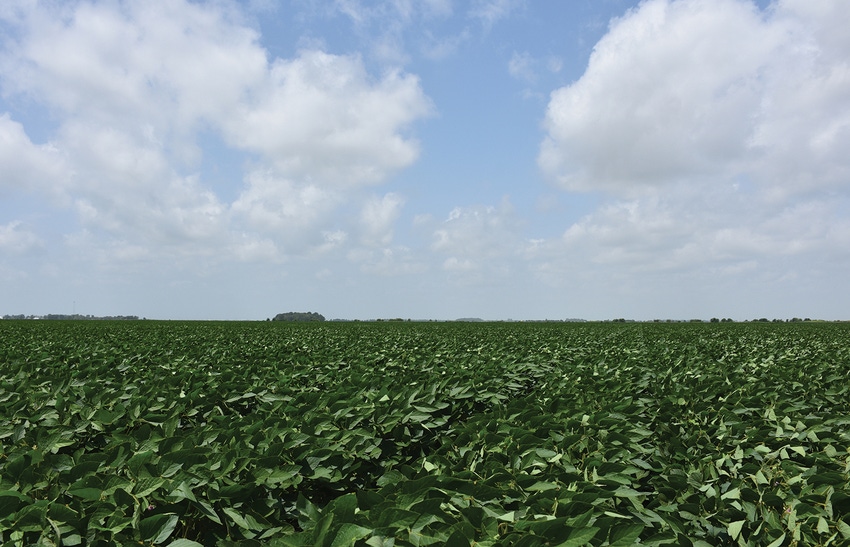
This year was one for the record books, according to Andrew Grobmyer, executive vice president & executive director of the Agricultural Council of Arkansas.
"We had a lot of major things going on," Grobmyer said. "It wasn't just a little passing year. It was one that we'll all remember."
Grobmyer points out that while he was in the hospital with his wife anticipating the birth of his second child in January, he started picking up a developing story as news of a virus in China began hitting the headlines.
 Andrew Grobmyer, executive vice president & executive director of the Agricultural Council of Arkansas. (Courtesy Agricultural Council of Arkansas)
Andrew Grobmyer, executive vice president & executive director of the Agricultural Council of Arkansas. (Courtesy Agricultural Council of Arkansas)
"I started to notice it at that time and then the virus jumped over to the U.S. pretty quickly," he said. "In late February, you could see the undercurrents of the issue beginning to take hold, cases emerge in the United States and people starting to wonder how to deal with it."
While Covid-19 wasn’t the only issue of the year, it did drive much of what happened throughout 2020, from relief packages to demand, as well as social interaction as it related to ag operations and the economy at large.
"We got together with some of the other agricultural organizations in Arkansas and our secretary of agriculture, Wes Ward, to figure out what it all means for agriculture and figure out what we need to do in a way that was minimally disruptive" he said.
"We've leveled out to where we sort of know what to do in this climate. Now we're at harvest and it seems like we're entering another phase of rapid spread, it hasn't gone away yet." He notes that it is good to hear that a new vaccine may be on the way that can be easily transported.
"It's going to be a challenging winter and we want all our people to be healthy."
Grobmyer said that they changed the format of their meetings in March when COVID-19 began to spread. All meetings since that time have been held virtually and they will be holding their December annual meeting virtually via Zoom to keep everyone safe.
"We'll probably want to wait until the vaccine is available," he said. "We're limiting our actions so we're not a part of spreading the virus."
Grobmyer noted that the ag council was successful at the state and federal level to make sure that the government treated the ag industry as essential, allowing the industry to operate at full capacity.
"We were able to ensure that nothing disrupted our businesses," he said. "That was important."
Various aid programs were important to agriculture this year, including the Coronavirus Food Assistance Program (CFAP), which provided direct payments to producers as relief to those impacted by the coronavirus pandemic.
"Also getting the Market Facilitation Program (MFP) payments out was timely and good," he said. "Those things helped, but also the run up in commodity prices has been welcomed.
"We're currently monitoring the process in Washington as the president elect builds his team. We're hopeful that he will choose people in his cabinet that will recognize agriculture for what it provides to this country and not have an adversarial relationship with the industry. We need policies that will play to our favor – work for us and not against us."
Congress and public policy
He said the council is also looking at Congress and how things are falling into place following the November election.
"There's a chance that Senator Boozman (R-Ark.) could be chairman of the Senate Ag Committee," said Grobmyer. "We feel that would be important to Arkansas agriculture, Mid-South agriculture and U.S. agriculture. So, we are excited about those prospects and would like to see that."
On the House side, Grobmyer said that Congressman Rick Crawford, R-Ark., is a high-ranking member on the ag committee and feels good about the state's position. He also noted it will be interesting to watch the outcome of the Georgia runoff election as the results may determine whether congress stays divided and Boozman remains in position to take the leadership spot on the ag committee.
"The state general assembly will come into session on Jan. 11," Grobmyer said. "We'll have activity there, too."
The assembly is trying to figure out how to meet with the increased Covid-19 numbers. They will be spreading out and utilizing plexiglass barriers while in session.
Also, at the state level, Grobmyer said that the issues today seem to be getting a lot more notice than issues of the past.
"They continue to work through the dicamba issue," he said.
The Arkansas State Plant Board Pesticide Committee met on Friday, Nov. 20 and failed to reach a consensus for state recommendations regarding the EPA's new labeling of dicamba. Current application restrictions remain in place until the full board comes up with their rules.
"It's been a tough issue," he said. "The farming community feels a need for having all the seed and herbicide technologies available. It seems that the availability of multiple products is effective in helping to combat resistant weeds.
"I do expect the Plant Board to tailor the rules to Arkansas and at some point, have a cut off date based on temperature and the concern for volatility as it relates to temperature."
The board is aware that a decision needs to be made quickly and Grobmyer believes they will act soon, as planting decisions will be made shortly.
"Many farmers want access to the technology," he said. "The farmers that want to use the technology want to use it up until and when the crops are at a state where they are ahead of the weeds."
The growing season
Grobmyer notes that the growing season definitely had its problems, but that the industry, for the most part, dodged some bullets.
"We certainly had our challenges with the heavy rainfalls in the spring, delayed planting and then the summer months and into harvest we had the hurricane issues pop up," he said.
With heavy winds and rain, some of the crops suffered - cotton as moisture brought boll shed and some rice lodging due to the winds. But he said there weren't a lot of crops destroyed in Arkansas and most crops weathered the storm.
"Generally, I think attitudes are a little bit better, " he said regarding the season. "People have been suffering for several years now with low commodity markets and not a lot of help out of Washington. Recently we've seen help and we're beginning to see prices across the board respond positively."
He said he hopes to see the prices staircase up for next year and would like to see them pick up without any need for additional aid.
"As fast as things go up, they can come back down," he said. "We just want our members to be able to make it in the black."
The peanut story in Arkansas is also a hopeful story, according to Grobmyer. The new Delta Peanut plant in Jonesboro services peanut growers in the bootheel of Missouri, Arkansas and northeast Louisiana.
"It's been one bright spot that we in Arkansas can take a lot of pride in," he says. "Hopefully, that will continue to lead to a strong peanut industry and some other opportunities."
The National Agricultural Statistics Service reported that in 2020 there were about 40,000 acres of peanuts planted in Arkansas, up 6,000 acres from the year before with an 11% increase in production.
"Production numbers are expected to tick up from 2020 because they're going to have greater capacity," he said. "The demand seems strong. I think the pandemic led to a lot of people buying."
Prices look better for both peanuts and rice as demand for non-perishable food items increase because of the pandemic, he said.
Grobmyer went on to note that he was anxious about the cotton market and people back off from shopping, but he also said that as they move back into the market it could bump prices back up again quickly.
He noted that there is good traction in the cotton market with sustainably grown, naturally processed fiber as the industry moves ahead with the Cotton Trust Protocol guaranteeing brands and retailers responsible production of the crop.
"I feel the optimism for 2021 is moving up," he said. "Hopefully with the vaccine, the economy will open back up and we'll see a nice run on demand. I think that would be positive for everything."
About the Author(s)
You May Also Like






